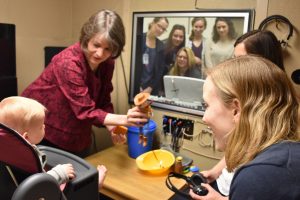On April 13, 2018, first-year audiology graduate students in the Division of Speech and Hearing Sciences’ Doctor of Audiology (AuD) program participated in a training lab where they observed visual reinforcement audiometry, a behavioral assessment procedure used to estimate hearing levels in young children. The technique was demonstrated by Dr. Patricia Roush who directs the pediatric audiology program at UNC Hospitals and is a professor in the Department of Otolaryngology. First-year audiology student, Crystal Smaldone, worked with Cora Poindexter, nine months old, in an audiology test booth at the Carolina Institute for Developmental Disabilities. Cora is the daughter of the Department of Allied Health Sciences’ Director of Communications, Elizabeth. Crystal describes the experience of working with Cora in the Q&A below:

Q: Where are you from, and where did you complete your undergraduate studies?
A: I grew up in Wyoming and Utah, and I studied at Brigham Young University in Provo, Utah.
Q: How did this experience fit into your training as a future audiologist?
A: Audiologists work with many different patient populations, and this experience was specifically designed to help us get hands-on training with the pediatric population.
Q: What did you learn about interacting with babies/parents/other students?
A: Today was an excellent reminder that every child and family is different. As clinicians, we need to be sensitive to individual temperaments and personalities in order to provide the best experience for our patients. Cora is such a happy and social baby, so interacting with her was a treat. This process was a reminder of the value of teamwork in audiology, as well. While I was in the booth, a whole team of students was outside of the booth to help in any way necessary. Working together helps us optimize the time we spend with families and make appointments more effective.
Q: Why are experiences like this important to your education?
A: Experiences like this are so important because they give students the chance to interact in a meaningful way with real families and children, and to be tutored by incredible clinicians who are already in the field. This experience was about going beyond textbook readings and lectures to really apply what we have learned in a clinical setting.
Q: How did you feel in the audiology booth, and what did this exercise entail?
A: I felt very comfortable in the booth knowing I had a top-notch audiologist, Dr. Pat Roush, on the other side of the booth to direct me as needed. My main focus was keeping Cora comfortable and happy so my team working on the other side of the booth could gather as much audiologic information on Cora as possible. I was paying attention to Cora’s state and strategizing from minute to minute on how to keep her engaged. At the same time, I was listening to the team outside of the booth for any steps they needed me to take in order to keep the appointment running smoothly.
Q: How will this experience help you in the future?
A: After today, I think I will feel more confident in knowing how to approach pediatric audiology appointments. Clearly, I have a lot more training to get under my belt, but today helped me get a better sense of what toys and strategies are best suited for evaluating the hearing of young children.